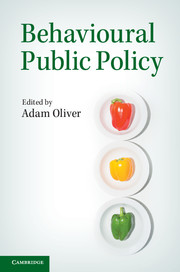Book contents
- Frontmatter
- Contents
- List of Figures
- List of Tables
- List of Contributors
- Introduction
- 1 Ambiguity aversion and the UK government’s response to swine flu
- 2 Models of governance of public services: empirical and behavioural analysis of ‘econs’ and ‘humans’
- 3 From irresponsible knaves to responsible knights for just 5p: behavioural public policy and the environment
- 4 The more who die, the less we care: psychic numbing and genocide
- 5 Healthy habits: some thoughts on the role of public policy in healthful eating and exercise under limited rationality
- 6 Confessing one’s sins but still committing them: transparency and the failure of disclosure
- 7 How should people be rewarded for their work?
- 8 Influencing the financial behaviour of individuals: the mindspace way
- 9 Decision analysis from a neo-Calvinist point of view
- Index
- References
3 - From irresponsible knaves to responsible knights for just 5p: behavioural public policy and the environment
Published online by Cambridge University Press: 05 June 2014
- Frontmatter
- Contents
- List of Figures
- List of Tables
- List of Contributors
- Introduction
- 1 Ambiguity aversion and the UK government’s response to swine flu
- 2 Models of governance of public services: empirical and behavioural analysis of ‘econs’ and ‘humans’
- 3 From irresponsible knaves to responsible knights for just 5p: behavioural public policy and the environment
- 4 The more who die, the less we care: psychic numbing and genocide
- 5 Healthy habits: some thoughts on the role of public policy in healthful eating and exercise under limited rationality
- 6 Confessing one’s sins but still committing them: transparency and the failure of disclosure
- 7 How should people be rewarded for their work?
- 8 Influencing the financial behaviour of individuals: the mindspace way
- 9 Decision analysis from a neo-Calvinist point of view
- Index
- References
Summary
Introduction
How should individuals be encouraged to change their behaviour in order to reduce their impact on the environment? How can they be persuaded to curb the waste they make, to decrease the air and water pollution they generate, to throw away less waste or to reduce their carbon footprint? Should government policy-makers rely upon people’s sense of social responsibility or their feelings of public duty to behave appropriately? Should governments simply supply individuals and households with information about the environmental cost of their activities? Explicitly appeal to a sense of public duty through exhortation and entreaty? Or should they go in a different direction, give up on notions of social responsibility and public duty, and instead try to regulate in some way those activities with an adverse impact on the environment? If so, in what way? Through imposing bans or other forms of legal restrictions on those activities – or through creating a financial incentive to reduce the activities by imposing a charge or tax on them, or on the waste they generate?
The answer to these questions will in part depend upon the answers to a further set of questions concerning the structure of individual motivation. Should individuals be regarded as essentially public-spirited with respect to the environment, committed to promoting the welfare of their fellow citizens and the wider society through economizing on the damage they do: socially responsible ‘knights’, in terms of a metaphor one of us has used elsewhere (Le Grand, 2006)? In which case, the provision of the relevant information, perhaps coupled with some exhortation to remind people of their social duty, should be sufficient to change their environmentally damaging behaviour. Or should people be treated as primarily self-interested agents, indifferent to those negatively affected by their waste products and only responsive to incentives that directly affect (either positively or negatively) their own personal interests: not knights, but something closer to those whom David Hume (among others) termed ‘knaves’? In which case, the government will need to use policy methods that appeal to people’s sense of self-interest (or self-preservation), such as charges, taxation, subsidies or direct regulation.
- Type
- Chapter
- Information
- Behavioural Public Policy , pp. 69 - 93Publisher: Cambridge University PressPrint publication year: 2013
References
- 4
- Cited by



